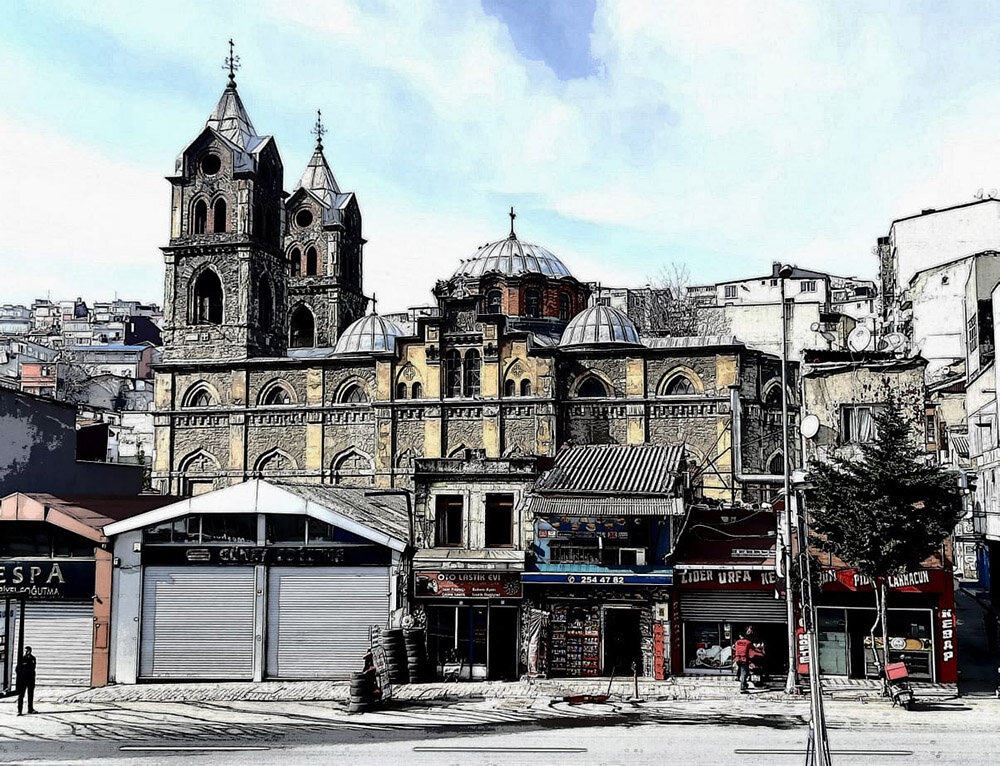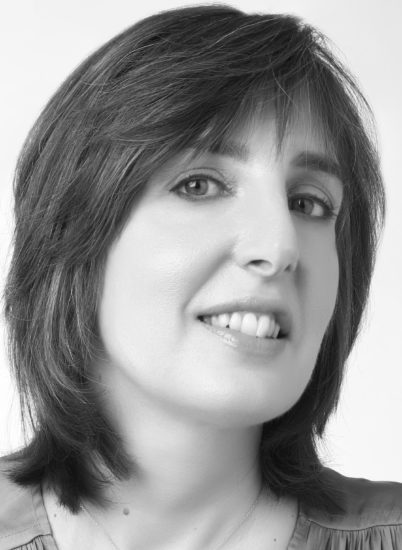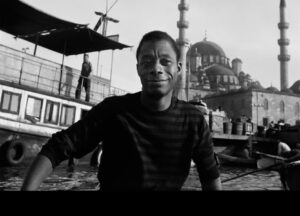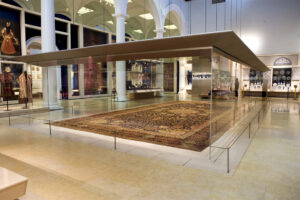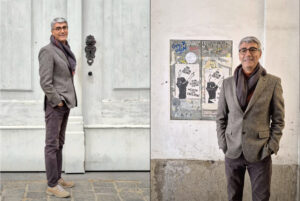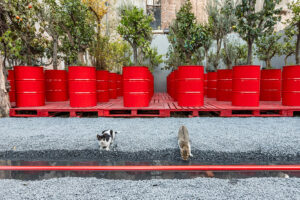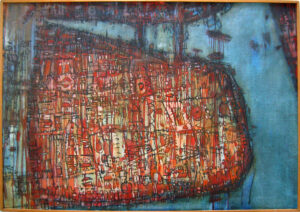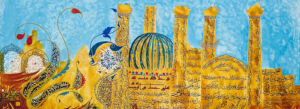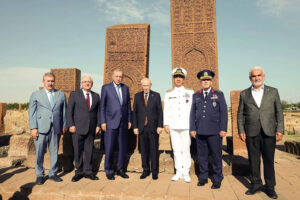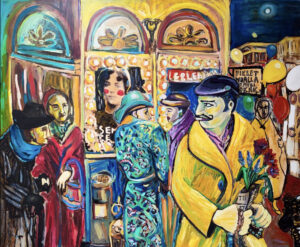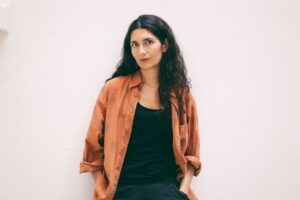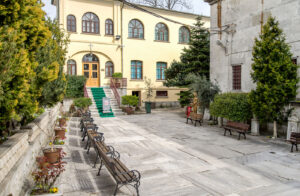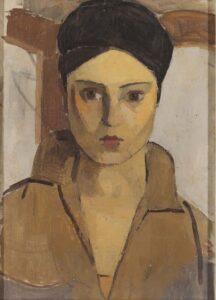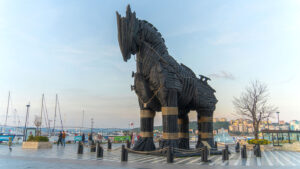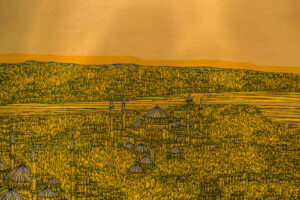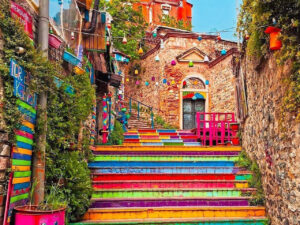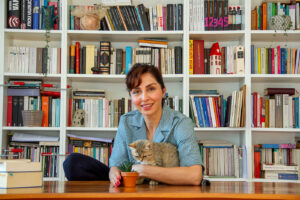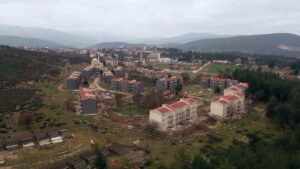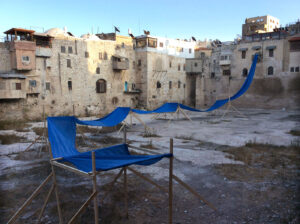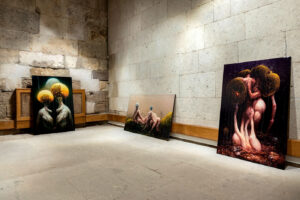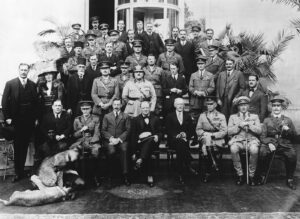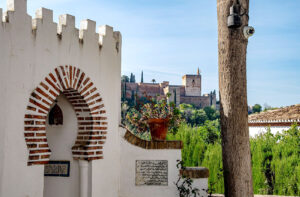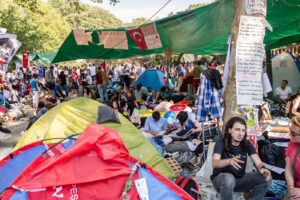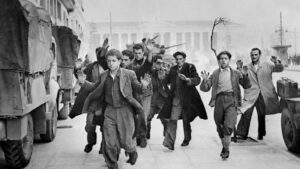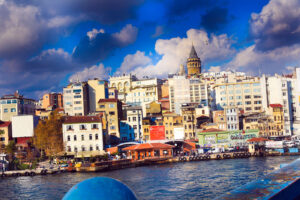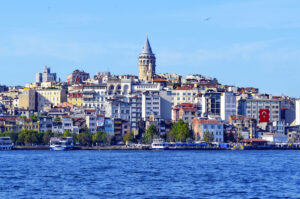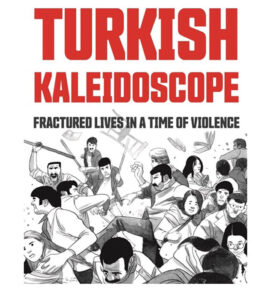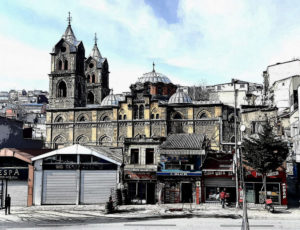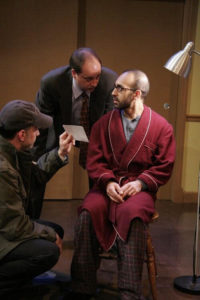Rana Haddad interviews Istanbullu novelist Nektaria Anastasiadou about the little-known Rum community of Istanbul featured in her new novel.
A Recipe for Daphne first arrived in my inbox as a pdf manuscript a year or so before it had found a publisher. Nektaria Anastasiadou contacted me on Twitter after she had read my first novel, The Unexpected Love Objects of Dunya Noor. She felt an affinity between our literary voices, even though my novel was set in Syria from the 1970s to ‘90s and hers in Istanbul between 2011-2012. Both our texts were out-of-the-box in that we combined a literary voice with a playful and entertaining tone, and used humor to address sometimes intense and painful themes. We both seemed to write about the Middle East in a way that was not often familiar to an English-reading audience, and had both experienced rejection from mainstream publishers resulting from that lack of familiarity, or attempts to make us rewrite our novels to fit an often stereotypical view of our native worlds.
When I first began to read Nektaria’s manuscript, I was a little taken aback by the character of Fanourios Paleologos (or Fanis). Oh my god — why is she writing about a 70-year old skirt-chasing fantasist who thinks he can have any young woman he likes, including the rather beautiful 30-something Daphne who had just arrived in Istanbul?
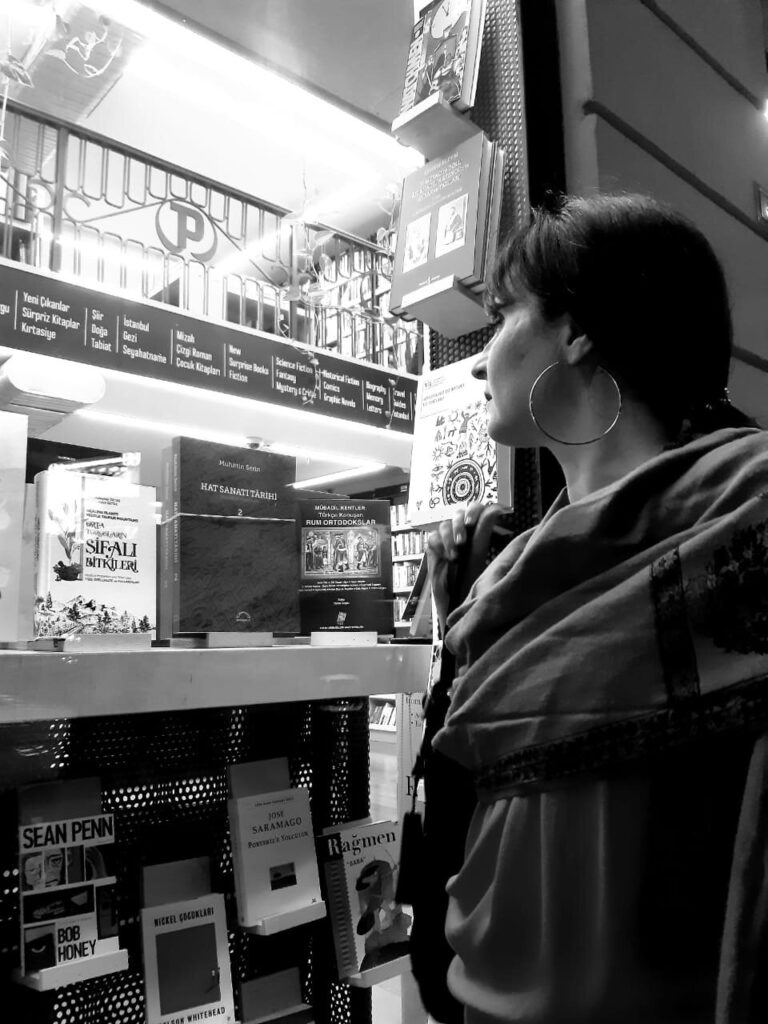
As I read through the pages I started to see the delicacy of Nektaria’s narrative style and her purpose behind the partly comical, partly touching portrayal of this mischievous Greek orthodox church cantor, and then the array of other arresting characters that people this novel, including Kosmas the clumsy and shy master pastry chef (dressed in a most unflattering way by his mother who would like him to stay single forever).
Kosmas also falls for Daphne’s charms but does not know how to approach her. Fanis gives him the wrong advice in order to slow down his progress, which he cleverly ignores. He has another plan too; Kosmas decides to find a recipe for a long-forgotten pastry that people in Istanbul or “The City” had mysteriously stopped making since an anti-Rum pogrom in 1955. Why is this recipe so important for Daphne, and what impact did the pogrom—which took place more than 50 years ago—have on these characters’ hearts and destinies? This is a novel about now, but also then, and about how the past can seep into the present, both in its beauty and pain, but it is also essentially about survival and about thriving against all odds.
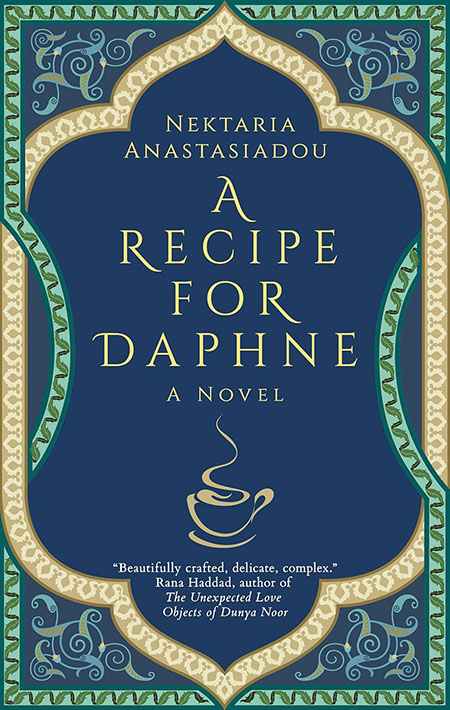
What I found most fascinating about A Recipe for Daphne, from a personal point of view, apart from its truly entertaining characters and startling observations, and the texture and skill of its language and style, was that it reminded me of my own childhood and teenage years, of a world I had also left behind — not in Istanbul but on the coast of Syria. In Syria the Rum did not speak Greek nor Turkish but Arabic. However, except for their use of language, everything that I read in a Recipe for Daphne evoked that same culture, spirit and even humor and outlook on life that I had grown up with as a child and teenager. The heroine of my own novel, Dunya Noor, was also from a Rum (or Greek Orthodox) family, yet in my novel I did not explore that aspect of her and her family’s life, which was only mentioned in passing. I had also never been aware of that word in my own life and never dug deeper as to what the word Rum, which was recorded in my passport and Syrian identity card, had meant.
Perhaps it was only after I read Nektaria’s novel that I fully realized that the word Rum referred to the word Roman, and meant that we were once members of the Eastern Roman Empire, otherwise known as Byzantium. In A Recipe for Daphne religion for the Rum is not simply a spiritual orientation but mostly about culture and way of life. For example, her church cantor is very much a lady’s man, and the priest regularly reads coffee cups as well as GQ magazine. In Syria it was the same; being Rum or Greek Orthodox was not a reason to be particularly prudish or fanatically religious, but often a way of life full of a delicate knowledge of how to dress, what to say and how to eat, along with all types of rituals and habits developed and inherited over centuries.
The reasons for which the Church divided into Orthodox and Catholic in 1054 were political as well as ecclesiastical. With the passage of time, Western Christianity took a disparaging and even inimical stance toward Eastern Orthodox Christians, as in the case of the Fourth Crusade, during which Western Christians sacked Constantinople (modern-day Istanbul). Even today, the West continues to ignore the existence of Christians in the Middle East. So much so that, when Nektaria sent her manuscript to agents and publishers in the UK and the US, she was regularly told that it would be a difficult novel to publish because the world of the Rum is unknown and therefore of no marketing value. One editor went as far as to tell her that she was “not moved by the Rum community and its existential crisis,” while another US editor and an agent asked Nektaria to add bombs to the story, because “that’s how we think of Istanbul in the US.” Of course, Nektaria refused and persisted until she found a home for her novel where she would not be asked to fit her narrative to their pre-conceived ideas.
Rana Haddad: Before we discuss Istanbul and the world in A Recipe for Daphne, could you define the word Rum?
Nektaria Anastasiadou: The word Rum comes from the Greek word “Ρωμιός/Ρωμαίος,” which literally means Roman. The citizens of what we call the Byzantine Empire called themselves Romans, not Byzantines, because they lived within the Eastern Roman Empire. The primary language of the Eastern Romans was Greek and the official religion of the empire was Orthodox Christianity. After the Ottoman Empire succeeded the Byzantine Empire, the Ottomans referred to the Orthodox Christians in its lands as Rum, regardless of whether they spoke Greek or other languages. Ιn both the Byzantine and Ottoman empires, the term Rum referred to a multi-ethnic population.
Today, the Rums of Istanbul are united by adherence to the Orthodox Church and the Greek language. However, the term is still multi-cultural. Istanbul Rums have heritage from Istanbul itself and also from various parts of the Balkans, Turkey, and other Ottoman lands. Some also have mixed heritage. They may have some Levantine, Armenian or other heritage. Rum is usually translated as “Greek” in English, but I find the word Greek is confusing. It makes people think that the Rums are recent transplants from Greece rather than a native population that has lived in Istanbul for at least generations if not millennia.
TMR: Can you talk about the significance of Istanbul in your novel, with respect to Daphne your heroine and to you personally?
NA: For me, Istanbul is more of a character than a setting. In the Istanbul Greek dialect, we refer to Istanbul as the Polis (City), as if there were only one city in the whole world. The Polis is at the center of the novel. Daphne says, “In Istanbul you never know what’s around the next corner.” Whether you love or hate the City, you must agree that it is never boring, and it is therefore an endless source of inspiration. A Recipe for Daphne grew out of it and is inseparable from it, just like the rest of my writing.
TMR: What is the “magic” of the “City” to which you refer and conjure up in your book?
NA: Daphne’s mother Sultana refers to Istanbul as magic, but I personally would say that it has an irresistible charm that comes from its two-thousand-year history…Byzantine, Ottoman and Turkish, and from the mixing of peoples and religions especially during the Ottoman period. This is what Daphne refers to in the book as the Byzantine and Ottoman salt. The presence of salt is not felt if it is in good measure, but its absence renders everything tasteless. Daphne finds her life in Miami tasteless in comparison to her life in Istanbul.
TMR: Kosmas feels that if he were not in Istanbul, he would not be himself, he would be in danger of losing himself. I find that fascinating. The feeling of becoming extinct, of being in danger of becoming extinct, a vanishing community….
NA: Plato writes about the importance of harmony between the psyche and polis, or the soul and the city. Kosmas, a pastry chef and one of the main characters of the book, studied in Vienna and perhaps toyed with the idea of leaving, but he only feels at home and at peace when his soul is in Istanbul, the city in which his family has been rooted for as long as he knows. He has internalized the city to such a degree that he doesn’t want to leave even to visit other places. In a larger sense, this attachment is related to his fear—and everyone’s fear—that the Rum community could disappear. I share his attachment, but I firmly believe not only in the survival, but also in a renewed flourishing of the Rum community of Istanbul.
Daphne, who has Istanbullu parents but who has grown up in Miami, also feels this soul attachment to Istanbul even though she was not born in it. But her attachment will require a choice. If she chooses the home of her soul, she will have to leave everything behind from her previous life in Miami. If she chooses her parents and her status quo in Miami, she will lose a part of herself. And even if she does choose Istanbul, she will be one more member of the community, unless she and Kosmas have children. Perhaps this doesn’t seem like much, but I do believe that so much in life depends on one. One person, one opportunity, one decision.
TMR: I want to hear exactly why you chose the character of Fanis Paleologos as the key character in this story, and how he came about in your imagination?
NA: In the summer 2010 or 2011, I was living in an apartment in the street of Faik Paşa in the historically rich Çukurcuma neighborhood of Istanbul, which is known for its trendy cafes and antique shops. One evening I was sitting in my cumba—a traditional Turkish bay window—and imagining how the street’s nineteenth-century stone buildings would have looked sixty or seventy years before. I began writing about them in my notebook from the perspective of an old man who had lived all his life on that street, who had seen all its changes over time. He would have been born in 1935, when the neighborhood was still Rum, manicured, and well-kept. He would have been a young man during the pogrom of 1955, when organized mobs broke into shops and destroyed their contents. He would have been an antique shop owner by 1964, when Rums with Greek passports were deported, taking with them family members who held Turkish passports. Later, he would have seen the degeneration of the neighborhood. He would see the buildings fall into disrepair. Some would even become derelict and vacant. And then, by 2011, when the story starts, he would have seen the regentrification of the area. This old man became Fanis.
TMR: Can you describe to us the vanished world of Fanis’s youth, what it means to you and what is its significance?
NA: The Rum population of Istanbul was about 100,000 when Fanis was born. I’ve heard older people say that at that time, you mostly heard Greek when you walked in Pera, or Beyoğlu as it is now called. Men didn’t dare walk in Pera without putting on a suit and tie, and women wore hats, beautiful suits and dresses. The avenue was lined with small, upscale businesses, elegant restaurants and pastry shops instead of chain stores.
At one point, Fanis loses himself in his memories of an old pastry shop at which he used to meet his fiancée. When he surfaces from the flashback, he looks around at the other customers thinks “Everyone is dressed badly. Which means, of course, that it is still 2011.” Both Fanis and I miss the elegance and grandeur of those times, even though I didn’t personally see it.
American author Ada Calhoun wrote the following: “Nostalgia, which fuels our resentment toward change, is a natural human impulse. And yet being forever content with a spouse, or a street, requires finding ways to be happy with different versions of that person or neighborhood.” To really love a place, you have to love it when it changes, so both Fanis and I try to appreciate Istanbul as it is today but I can’t say that I wouldn’t love to time travel to see the lost elegance and grandeur of Pera.
TMR: Can you tell us about the significance of bearing Rum children and Fanis’s self-image as a 76-year-old lady’s man who thinks he can have any lady of child-bearing age he likes?
NA: The book begins with Fanis at the German Hospital in Cihangir. He faints during a doctor’s visit. When he wakes up, he thinks that the doctor is the god Hermes. The doctor diagnoses Fanis with cerebral arteriosclerosis and vascular dementia, which could lead to death. Despite the anxiety that the diagnosis causes Fanis, he remains determined to fall in love, get married and have children, which he sees as his duty because the Rum community cannot survive without children.
Read a review of A Recipe for Daphne
Of course, we could poke fun at Fanis and say that he is deluded. After all, he believes in ancient Greek gods and has an exaggerated view of his male prowess and fertility. However, we can also see Fanis as a metaphor for the Rum community itself. Fanis has been given a death sentence, but he refuses to accept it. And really, why should he? Why do we have to limit ourselves to diagnoses and prognoses which may be incorrect?
Fanis refuses to accept the end. He decides to keep moving forward and believe that anything is possible. He doesn’t limit himself to societal expectations that he should curl up and die. He doesn’t care what anyone thinks. He doesn’t care that some people may think that he is ridiculous because he believes that he can reproduce. He believes that love and marriage are possible at any age, and he also believes in the renewal of the Rum community. This is what makes him my favorite character.
TMR: Which part of your portrait of Fanis is just humor and which part is perhaps a tender evocation of him as stalwart and stubborn man from a vanishing world determined to stay alive? Is Fanis being unreasonable or will men like him and the few young ones like Kosmas find enough women like Daphne with whom to repopulate the community?
NA: The future depends on each and every Rum child that is born and educated in Rum culture and language; it depends on each Rum who decides to remain in the city and create in whatever way s/he can; and it also depends on each participant in Rum culture who decides to move to or return to the City and participate in the community. Miracles depend on both on individual effort and community solidarity. Every single person counts.
TMR: Tell me more about the Balkanik pastry and how your novel was inspired by it and when you first heard about it and the lost recipe?
NA: An elderly Rum gentleman told me about a forgotten pastry called the Balkanik. He said that it was something like a big éclair, but with differently flavored crèmes inside. Each crème symbolized a different Balkan people and their harmonious coexistence. Because the peaceful coexistence of people with different religions, cultures and languages is something that fascinates me—and also something that I see in Istanbul—the description of the Balkanik remained in my mind. I knew that I wanted to write about a pastry chef who would resurrect that old recipe. Thus, my character Kosmas was born.
The resurrection of the Balkanik is another metaphor for the renewal of the community. It is a forgotten recipe, or at least the form of it that was described to me is largely forgotten. Kosmas’s effort to resurrect it and all that it symbolizes—the harmonious Ottoman symbiosis of different peoples and cultures—is a personal effort to continue Rum traditions and renew the community.
TMR: Does the recipe book you mention from the early 1900s exist?
NA: The family recipe book for which Kosmas’s business partner Uncle Mustafa searches is entirely made-up. But I had fun writing about it.
TMR: I love the way you were able to evoke the irrepressible joie de vivre and sensuality and humor of the Rums of Istanbul, despite their memories of the 1955 pogrom. Why do Fanis and Daphne’s aunt Gavriela want to stay in the city despite such memories?
NA: First, we have to remember that, although there were some unfortunate events, life in Istanbul has been mostly quite good, and the Rum community has strong friendships and relationships with Muslim neighbours. And even in bad times, you can love a place so much that you want to stay regardless of circumstances. You create your own world. Fanis and Gavriela are like that. They may be members of a minority, but they still meet with their friends for afternoon tea just like they did decades ago. They still joke and have fun, no matter what is going on.
I remember a May day a few years ago when most of the city center was in lockdown. I was having tea with some ladies in the hall of Saints Constantine and Helen Church in Tarlabaşı. After we finished our tea, we got up to leave, but somebody said that we couldn’t because tear gas was being used in the street. The hostess, without missing a beat, said “Oh, well. Time for coffee, then.” She took out a Bunson burner and made everyone Turkish coffee. I love this toughness and resilience, this desire to keep going and have another coffee no matter what is going on.
TMR: The Rums have a real talent for enjoying every detail of life, which seems to me very Mediterranean. Also I enjoyed their sense of humor and the awareness of the erotic which fills the pages of the book. Is this something Mediterranean, do you think, or is it Eastern, or do the Rums have a particular flavor of the art of life that is unique to themselves?
NA: I can’t speak for all Mediterranean countries, but I can say that many Rums have an excellent sense of humor. Perhaps that’s part of having faced so many difficulties in life. If you don’t laugh, you’re lost. And there certainly is a particularly Rum art of life. Our elders speak about the Istanbul Rum “rhythm” or ρυθμός in Greek. This rhythm refers to the importance of the family meals, afternoon coffees, church services, and other social gatherings.
TMR: I also love the continuous supply of cups of tea, skillfully made Turkish coffees, the array of pastries and savory dishes, not to mention Kosmas’s patisseries. I love how your chapters are structured around meals, deserts, and drinks.
NA: The Rum dining table—and more generally the Mediterranean dining table—is an artisan’s work bench. At the dining table, we enjoy skillfully prepared food, revive ourselves with coffee and tea, relax with wine and other drinks, tell news and stories, advise each other. At the dining table, engagements are conducted and weddings are celebrated. Agreements are made and partnerships are sealed. Food and drink are at the center of the culture, so they are also at the center of my writing.
TMR: What about writing an Istanbulite Rum recipe book?
NA: I’m a fiction writer, so I will leave cookbook writing to the professionals. But I do share Rum recipes and culinary traditions on Twitter, and food continues to be important in the novel that I am writing now. In fact, the Rum narrator’s dead father gives her recipes in her dreams.
TMR: I feel that your novel is it not necessarily about religion or race, but more about a mood or a culture or a way of life.
NA: Absolutely. This is the position of both Daphne and her Jewish friend Selin. No person is a thoroughbred anything. You may think that you are 100% French, Greek, Turkish, Chinese, Nigerian, Egyptian, or whatever, but if you DNA test you will most likely learn otherwise. I don’t believe in categorizing people according to their descent. But I do think that we can identify with certain cultures more than others and define ourselves by those cultures.
TMR: The sense of belonging to the Rum Orthodox church seems to be much more about culture and community than it is about strict codes of conduct or theological beliefs, which makes the church quite an entertaining place for people to gather. Do you feel there is a difference in attitudes to the individual and community between Istanbul and the West?
NA: Being Rum and participating in the rights of passage in the church can be about cultural or religious belonging or both. In Istanbul, not just now but traditionally across generations, people have been allowed be members of the Rum community and also to define their own degree and manner of participation in the community and the church. There is no one way of being.
TMR: Rum values seem so different and so “old-world” in the best sense of that word. How will the Rum continue to exist and understand themselves in a globalized world?
NA: We have some old-fashioned traditions, but a strong part of the culture is modernity and progress. It has been like this for centuries. Rums, along with Jews, were the foremost merchants of the Ottoman Empire. They brought many innovations to Turkey. Even now, I am always impressed by older Rum women, who follow fashion and paint their nails crazy colors like bright orange or black for Sunday liturgy. Elderly Rums also use Facebook and love to learn foreign words, especially English and French, which they use liberally in conversation. I think that it is quite natural for Rums to maintain old traditions and embrace the future, because that is what has always happened within the Rum community.
TMR: Talk to us about the struggle between “identity and humanity,” which you mention in the novel.
NA: From the humanity perspective, we shouldn’t care what anyone’s religion or culture is, but rather whether we can relate to the other at a soul level. From an identity perspective, it’s understandable to want to marry someone from the same religion and culture in order to preserve that culture. I have heard people from mixed marriages say that they didn’t teach their children any religion or culture in order to allow them to make their own decisions, but later on they realized that they had deprived their children of both cultures.
TMR: Mothers seem to have a tremendous power in the world of this novel. You describe Istanbullu mothers-in-law as “devils in heels.” It was because of his mother’s advice that Fanis made the mistake of his life, with tragic consequences, or this is what he believes. And it is because of his mother’s emotional blackmail that Kosmas may end up losing and alienating Daphne.
NA: Mothers are powerful in Mediterranean culture. Many mothers see their sons as the most important men in their lives, almost like their husbands. And this can of course lead to problems not only in men’s relationship with their mothers, but also with their girlfriends or spouses. How to separate emotionally from one’s mother while still caring for her and without deserting her is another dilemma in the novel.
TMR: What are you working on now?
NA: In 2019, I won the Zografeios Agon, a literary award that was founded in nineteenth-century Constantinople. I developed the winning story into a novel, which I’m currently editing. Its narrator is Rum, but other main characters are Jewish. The novel is about female friendship, the single life, and anti-Semitism. It’s in Istanbul Greek.
TMR: Why are you writing in Istanbul Greek?
NA: Because it’s colorful, flexible, beautiful, and fun. The Nobel-prize winner Isaac Bashevis Singer, one of my favorite writers, wrote in Yiddish after the Holocaust when Yiddish was faced with extinction. He wrote the following about his language choice: “Not only Yiddish but all languages are constantly in the throes of death and in the terrible effort of being reborn.” Some people may say that the Istanbul idiom of Greek is dying. I, however, believe that it is being reborn, just like the Rum community of Istanbul.



